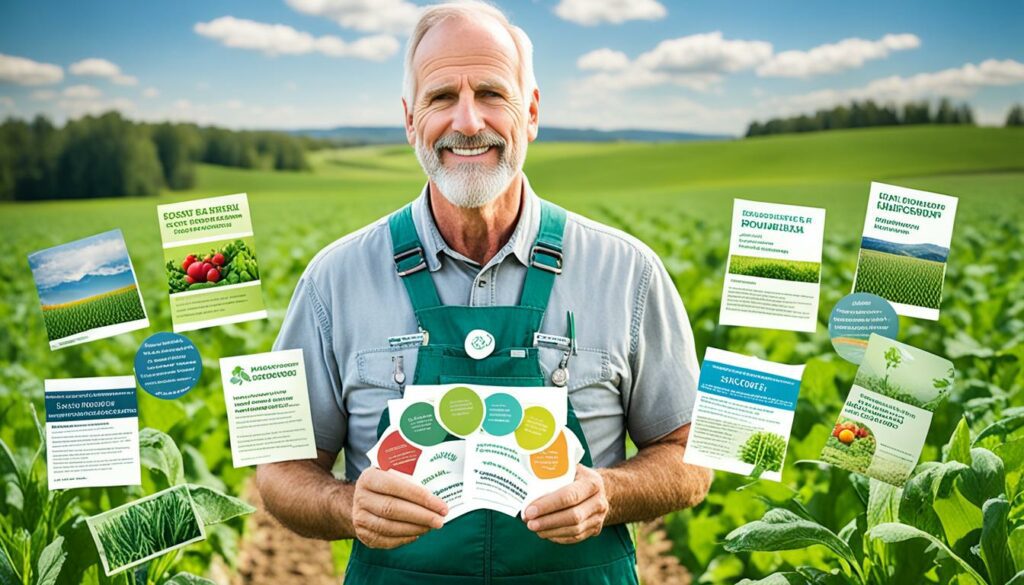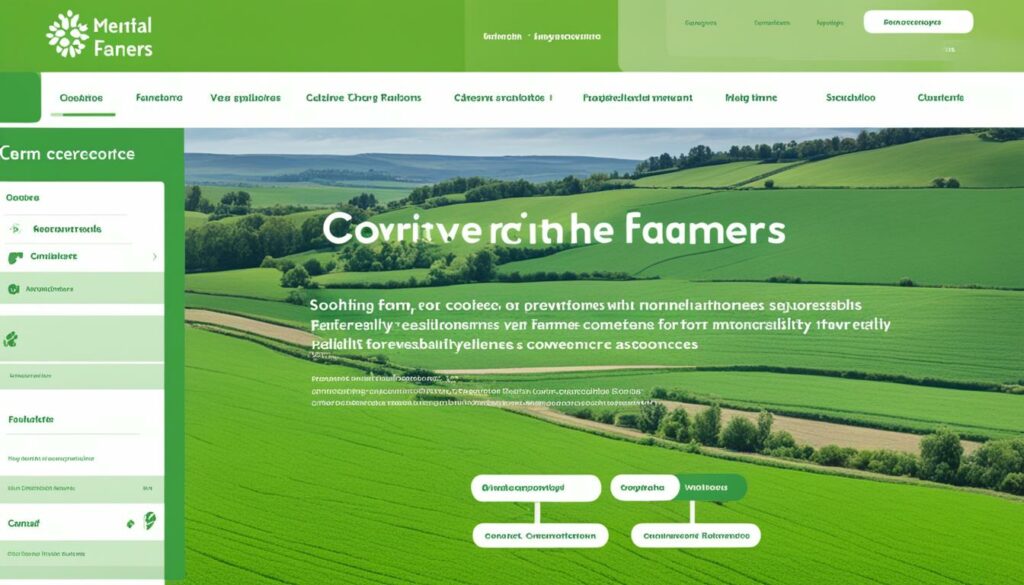Menu

In 2016, the suicide rate was much higher for farmers and ranchers than for most jobs. For every 100,000 men, 43.2 of them in farming took their lives. This alarming number shows the great need for support networks for farmer mental health.
Aware of the growing mental health issue in farming, a range of aids has been put in place. Stress hotlines, help for opioid abuse, and learning opportunities are just some examples. Avera Health System in South Dakota provides a Farm and Rural Stress Hotline. It’s free, confidential, and available 24/7 at 1-800-691-4336. This service shows the effort to look after the mental health of farmers.
Farm Aid offers a hotline (1-800-FARM-AID) and an email that connects farmers to many support groups. These groups, listed in an online directory, help with various needs. The National Farmers Union’s Farm Crisis Center points farmers to local and national aids in times of crisis.
Farming has its own set of mental health challenges. These arise from stress factors that are often beyond the farmer’s control. The 2020 Morbidity and Mortality Weekly Report showed a high rate of suicide among male farmers and ranchers.The study “Trends and Characteristics of Occupational Suicide and Homicide in Farmers and Agriculture Workers” noted that farmers face higher suicide rates than other jobs. This points to the urgent need for improved mental health awareness in farming communities.
Rural areas see more mental illness than cities, as found by the Rural Health Research Gateway. And the National Farmers Union highlighted that people in agriculture are more likely to suffer mental health conditions.So, mental health in farming must be addressed with tailored plans.
Many farmers, like those growing cash grain, show signs of depression. In Ohio, it’s 38%, and in places like Iowa and Colorado, it varies from 20% to 45%. This range shows why mental health awareness needs to adapt locally.
In Australia, older farmers face a significant risk of depression. This issue is also seen in Canada, where over half of farmers report feeling stress. These findings stress the urgent need for mental health support in farming.
Studies also link mental health with certain farm practices. For example, sheep farmers using pesticides may experience mental and brain health issues. And immigrant workers in agriculture and related fields in the US South often face poor health outcomes, highlighting the need for support.
So, the agricultural sector needs specific mental health support worldwide. It’s vital to recognise mental distress early, as it affects farmers’ work. The work of groups like the National Association for Rural Mental Health and the AgriSafe Network show the value of linking mental and physical health for better farming outcomes.
Farming life can be very tough, leading to serious mental health issues. Farming has its own set of pressures. It’s important to understand these to help properly.
Farmers face special challenges that affect their mental health. Money worries, unpredictable weather, and feeling cut off from others are big problems. Sadly, more farmers end their lives than people in other jobs, as shown by high male suicide rates.
A shocking 43.2 out of 100,000 male farmers took their lives in 2016. This figure was much higher than the 27.4 out of 100,000 for other working men. It tells us how tough life can be for those in farming.

Between 1992 and 2010, suicides among farmers and farm workers were higher. This highlights the urgent need for more help. Rural areas, where they mainly live, often lack mental health support. This makes the situation worse compared to cities.
It’s key to have strong support systems to help farmers with the stress. Many efforts such as helplines are in place to support farmers in need. These include the Farm Aid Hotline, which offers immediate help and disaster support.
Community involvement is vital. It helps to fight the feeling of loneliness that comes with farming. This support has helped reduce the stigma of mental health problems. Farmers now find it easier to seek help. The recent 11% decrease in this stigma shows these community efforts are working.
| Statistics | Indicators |
|---|---|
| Farmer suicide rate in 2016 | 43.2 per 100,000 |
| General male working adult rate in 2016 | 27.4 per 100,000 |
| Decrease in stigma barrier (Dec 2020 – Dec 2021) | 11% |
More farmers are now getting help from mental health experts. In December 2021, 41% of them sought care, up from 25% in April 2019. This shows that farming communities are becoming more aware of the importance of mental health support.
By organising mental health workshops, farmers gain crucial knowledge. They learn strategies to tackle their mental well-being challenges. These sessions are customised to meet the unique stresses of farm life. They provide priceless support and build a unified community.
Mental health workshops for farmers bring several key benefits. They raise awareness and provide practical tools for stress management. In a field where mental health can greatly affect work, these workshops are essential. They also work to lessen the worries about privacy and the shame often associated with seeking help.
Keeping up with upcoming mental health workshops for farmers is vital for the agricultural world. The Farmer Resource Network Online Directory and the MHTTC Network are key in sharing workshop news. These events cover important topics. They include how to manage stress in disasters, support for veterans in farming, and mental health in fishing.Then there is
By taking part, farmers gain access to great mental health resources. They also get to connect with FarmResponse® trained specialists. This can improve both their health and their work.
Farmers face many mental health challenges that need urgent help. The male suicide rate among farmers and ranchers is higher than in most other jobs. This makes having strong helplines like Avera Health and AgriStress vital.
Farmer mental health helplines across the nation provide secret, all-time help. Mental illness is more common in rural areas. Farming is known to be very stressful. It’s important to get help quickly for stress, depression, and anxiety.
“Suicide remains one of the leading causes of death in the U.S., making mental health support a pivotal aspect of community healthcare.”
Here are some important national helplines to know about:
Helplines just for farmers in some states provide tailored support. For example, the Illinois Warm Line is for farm families there. The Iowa Concern Hotline helps farmers in Iowa.

Having both national and state helplines means farmers can find the help they need. These helplines quickly connect farmers to health experts who understand their stress. This support can help save lives.
In recent years, farmer wellbeing initiatives have become more common. They’re helping those in farming deal with mental health issues. Organisations like Cultivemos and Rural Minds are leading these efforts. They work to raise mental health awareness and offer key support.
For example, Cultivemos aims to support farmers’ mental health with practical help. They offer special training and resources. Farming brings many challenges like price changes and natural disasters. These groups help farmers face these challenges and stay mentally healthy.
| Organisation | Focus | Support Offered |
|---|---|---|
| Cultivemos | Mental health awareness | Training, resources, and workshops |
| Rural Minds | Support groups | Rural mental health support groups |
According to a report in 2020, the risk of suicide is even higher among farmers. For male farmers and ranchers, the rate is 43.2 per 100,000. Yet among other male workers, it’s 27.4 per 100,000. This is why we need rural mental health support groups.
A study in 2018 found that farm operators and workers face a higher suicide risk, too. We know mental health issues are common in remote areas. That’s why groups like Cultivemos and Rural Minds are so important. They create support systems that fight off loneliness and isolation.
The COVID-19 crisis has made things even harder for those in farming. It’s brought more stress and less social contact. The support from these initiatives is critical right now. It helps farmers deal with the tough times and stay mentally strong.
Helping farmers deal with opioid addiction is vital. Many groups offer important resources. They aim to fight drug abuse and improve farmers’ health.

Farm Town Strong is a key group helping farmers battling opioids. They provide info and connect farmers with the right support. This makes a big difference in the fight against drug abuse in farming.
If farmers need help, there are hotlines they can call. The Avera Health System in South Dakota runs the Farm and Rural Stress Hotline at 1-800-691-4336. It’s open day and night. It helps farmers dealing with stress, depression, and drug issues.
The National Suicide Prevention Lifeline at 1-800-273-TALK and the SAMHSA National Helpline at 1-800-662-HELP (4357) also offer support. They guide people to the right help.
Teaching farmers about addiction is important. The Rural Resilience Online Course helps spot stress and suicide signs. It aims to reduce stigma and connect farmers with help.
AgriSafe Network trains healthcare workers on rural opioid issues. The National Association for Rural Mental Health boosts help for substance misuse in rural areas.
Farm Aid and their 1-800-FARM-AID hotline help too. They connect farmers with support groups. The Farm Aid Resource Guide for Farm Crisis Support gives detailed help with legal and disaster issues.
These groups working together show their strong support for farmers. They provide many resources. By using these networks and learning from educational programs, we can create a better farming community.
Farmers face many unique challenges that can impact their mental health. To help, there are strong mental health support networks. These are there to assist farmers with the special stresses of their lives.
The National Farmers Union highlights how farming jobs can lead to more mental health issues. They stress the need for focused support for farmers.
The National Association for Rural Mental Health (NARMH) is key in helping rural communities with mental health. They work on advocacy, research, and training, improving access to mental health care in remote areas.
Farm Town Strong tackles the opioid crisis in the countryside. It offers important info and help for opioid addiction. This shows that mental health and substance abuse connect closely in the farming world.
The Farmer Resource Network Online Directory links farmers to over 750 groups nationwide. They help with a wide range of issues, showing the big support network for farmers.
The Rural Resilience Online Course offers skills to spot stress, communicate well, and fight the stigma around mental health. It’s vital in boosting awareness and mental strength in farmers.
Support groups play a crucial role in rural mental health. They fight the loneliness many farm families face. These groups offer vital support for everyone’s well-being. The AgriSafe Network is one example. It provides professionals to help with health and safety in agriculture. They raise awareness and offer prevention services for mental health issues in rural areas.

The 2020 Morbidity and Mortality Weekly Report found high suicide rates among farmers and ranchers. In 2016, their rate was 43.2 per 100,000, higher than the 27.4 for other adults. This shows how much rural mental health groups are needed.
Studies from the Federal Office of Rural Health Policy show more mental illness in the countryside. This could be because of tough economic times, like low prices and natural disasters. Such issues make mental health harder for farmers and ranchers. So, having support groups in rural areas is very important.
Joining these support groups lets people share their stories and how they cope. It breaks the silence and fights the stigma around mental health. Still, some are afraid of joining due to the stigma. Services like the AgriStress Helpline are working to change this. They offer help from trained providers across the country.
Having a special 988 number for the crisis lifeline is a big leap for rural mental health. It means that help is just a call away in tough times. These steps show the vital role support groups have. They create a caring place, especially for those in agriculture, to find help, reduce stress and grow stronger.
Community-based efforts are crucial in helping farming communities deal with mental health. The help comes from local groups and is very important. They support not only farmers but everyone else living in rural areas. Organisations like the SCCAHS and UMASH are key in this work.
The SCCAHS focuses on health and safety in farming, providing studies and education. UMASH works for safer conditions in animal farming. Both are big on mental health support. They make sure farmers know where to get help.
The AgriStress Helpline is a big help in many states. It connects farmers with experts on their specific issues. These experts are in the FarmResponse® directory, ensuring top-notch care for all.
It’s vital to talk about mental health in the countryside. Physical and mental well-being are closely linked for farmers. Projects like the National AgrAbility Project fight the mental health stigma. They help farmers get over their worries and ask for help.
The Great Plains Center and the WRASAP aim to cover a lot of ground, helping many with their mental health. Over 90 million people live where mental health professionals are in too short supply. More and better community support can fill this gap.
| Organisation | Primary Focus | Region Covered |
|---|---|---|
| SCCAHS | Health & Safety in agriculture, fishing, and forestry | Southeastern U.S. |
| UMASH | Occupational health and safety in animal agriculture | Midwest U.S. |
| AgriStress Helpline | Mental health support for agricultural communities | CO, CT, MO, MT, OR, PA, TX, VA, WA, WY |
| Cultivemos | Mental health resources, trainings, and podcasts | Northeast U.S. |
| Rural Minds | Information and resources on rural mental health | Nationwide |
The farmer resource network online directory is a great tool for farmers. It has over 750 organisations that help with mental health, crises, and money problems. These services are there to support them.
This network includes the 988 Suicide & Crisis Lifeline. It’s open 24/7 and links farmers to over 200 local centres. This helpline is key for those facing mental health issues, offering immediate and relevant aid.
The farmer resource network online directory also lists the Farm Aid hotline. It runs from Monday to Friday and gives quick help to farm families in trouble. The AgriStress Helpline is crucial too, working in states like Colorado, Connecticut, and Texas.
Crisis help extends to the SAMHSA National Helpline, which is open all the time in English and Spanish. The NAMI HelpLine is another source, available on weekdays. It offers mental health aid to farmers at important times.
The farmer resource network online directory has services like Farm Rescue. They help farmers in places like Iowa and Minnesota when they face illnesses or natural disasters. The SAMHSA Disaster Distress Helpline gives free, confidential help during crises, providing round-the-clock assistance.
Many impactful services are listed, including the Trevor Project Lifeline for LGBTQ youths and allies. The Boys Town National Hotline also stands ready to help teens and their families across the country.
This guide helps farmers and people in rural areas find support fast. It aims to ease their stress and mental health issues in the farming world.

Both the Government and Non-Governmental Organisations (NGOs) play huge roles in helping farmers’ mental health. They make important policies and give needed resources. This helps make sure farmers get the right support.
The Federal Office of Rural Health Policy is leading the way in helping rural folks with mental health. They make policies that increase mental health care’s quality and access. They team up with others at state and local levels to deal with rural challenges.
The National Farmers Union (NFU) is a key player in looking after farmers’ mental well-being. They run many programs to help farmers get the support they need. Working with different groups, they make sure these services really help.
They support projects like Focus On Health and Healing Voices. These projects fight against mental health stigma. Also, schemes like Healthy Hospo and I Got Your Back address mental health across the food industry, offering broad support.
Together, these efforts from both Government and NGOs make a strong support system. They use policies, push for change, and directly help farmers. This approach ensures farmers and others in agriculture can care for their mental health well.
Farmers face a lot of pressure, leading to high levels of stress and health problems. Programs like the rural resilience online course and FarmResponse training help them deal with stress and mental health. These programs are made just for farmers to meet their unique needs.

The online course aims to make farmers stronger by teaching them how to handle stress better. It also helps them understand mental health issues and find help when needed. This is extra important because male farmers’ suicide rate in 2016 was 43.2 for every 100,000, much higher than other working men.
Joining these courses can really help by raising awareness about mental health and teaching coping strategies. This is a big step in reducing problems like heart disease and high blood pressure often seen in farming due to stress.
FarmResponse training is critical for helping with mental health in the farming community. It teaches people how to spot and manage mental health crises. This can lower the chances of suicide and other serious events.
A 2018 study showed farm workers and owners have a higher suicide risk. So, the FarmResponse training is key. It helps create a strong support system for quick help.
Educational projects like USDA NIFA FRSAN have made a real difference. They invested nearly $25 million in grants in 2021 for state farming projects. North Dakota’s FirstLink also helped over 1,100 people deal with stress through counselling between September 2021 and March 2023.
| Programme | Participants | Outcome |
|---|---|---|
| Idaho State Dept. of Agriculture workshops | 60 producers, 42 students | Enhanced financial management and succession planning skills |
| Idaho Farm and Ranch Centre workshops | 18 English, 71 Spanish participants | Increased awareness and management of farm stress |
| Massachusetts State Dept. of Agriculture peer support training | 100+ individuals | Development of peer-to-peer support network starting January 2023 |
Rural mental health charities are key in helping farmers with their mental health. They focus on the challenges farmers face. For example, the suicide rate for male farmers is much higher than other working men. This shows the urgent need for their work.
A study from 1992 to 2010 showed that farmers had higher suicide rates than many others. Charities offer important support, like helplines and lists of organisations. They understand the mental health struggles of farmers, which can be made worse by stress and depression.
Organisations such as the National Farmers Union and RAFI-USA do a lot for farmers. They offer education, disaster help, and support for mental health. Their work is not just about today, it’s to make lasting change. They also provide online courses to help people work with stressed farmers better.
Many support networks help farmers with mental health, like the National Farmers Union. They focus on offering resources and education for the mental well-being of farmers.
Stress from money problems and the environment can be tough for farmers. Feeling lonely because of working alone can also be hard. All these issues can affect the mental health of farmers.
Access to mental health services is vital for farmers’ health and work. It helps them handle stress better and get the help they need when they’re not feeling right.
Workshops teach farmers how to deal with stress and other mental health problems. They help farmers learn with others and give them real ways to manage their stress.
Yes, there are always new workshops and events for farmers’ mental health. They can keep up by checking the Farmer Resource Network Online Directory and the MHTTC Network resources.
There are hotlines like the Avera Farm and Rural Stress Hotline for farmers in need. They offer private and quick help from people who know about farm life.
Many states have their own helplines for farmers’ mental health. They connect local farmers to experts who understand their stress.
Projects like Cultivemos and Rural Minds raise awareness and help farmers. They provide resources and support to make life better in rural areas.
Efforts like Farm Town Strong fight the opioid crisis in farming places. They offer important help as part of bigger plans for wellness among farmers.
Support networks offer help, teach, and work to better farmers’ mental health. Groups like the National Farmers Union care about rural life quality.
Support groups are key for farmers facing loneliness and stress in countryside. They create a feeling of community and shared understanding.
Places like SCCAHS and UMASH offer local support for farmers. They do research, educate, and help with health issues specifically for farmers.
The Farmer Resource Network is great for finding help online. It lists over 750 organisations that can help farmers in many ways.
Government and NGO efforts are crucial for farmers’ mental health. They make policies and provide resources to help keep farmers healthy and happy.
Online programs like Rural Resilience and FarmResponse give farmers important skills. They help farmers spot mental health issues and connect with help if needed.
Charities work hard to help rural communities understand and deal with mental health. They do special work sometimes not covered by others.